Last Updated on November 14, 2025
With a range of boiler types available on the market, choosing the ideal one for your home or property can be a daunting task.
This comprehensive guide will help you explore the different types of boilers, examining their features, benefits, and potential drawbacks to ensure you make an informed decision.
Understanding the nuances between combi, system, and conventional (heat-only) boilers is essential to ensure your home remains warm and energy-efficient throughout the year.
By the end of this guide, you’ll have a clearer understanding of which boiler system is best suited for your household needs and how it impacts both running costs and sustainability.
Let’s dive into the world of boiler selection and find the perfect heating solution for your home!
Contents
- 1 Key Takeaways
- 2 Combi Boilers: The Space-Saving Solution
- 3 Heat-Only Boilers: Traditional Heating Systems
- 4 System Boilers: The Upgraded Choice
- 5 Alternative Boiler Types: Oil and Biomass Boilers
- 6 Factors to Consider When Choosing a Boiler
- 7 Find the Perfect Boiler for Your Home – Get a Free Quote Today!
- 8 Frequently Asked Questions
- 9 Conclusion
Key Takeaways
- Combi, heat-only and system boilers are the most popular types of boilers in the UK.
- Oil and biomass boilers offer alternative fuel sources for those without access to mains gas.
- Careful assessment of your home’s needs is essential when selecting a suitable boiler type.
Combi Boilers: The Space-Saving Solution
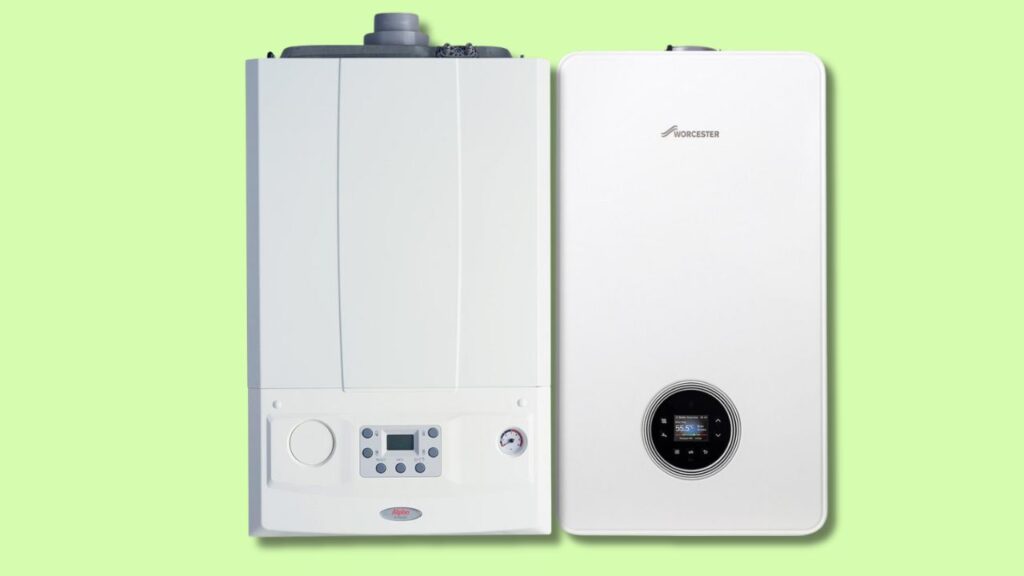
Combi boilers are the most popular boiler type in the UK due to their compact design and ability to provide instant hot water. These boilers eliminate the need for bulky storage tanks or water cylinders, making them ideal for small to medium-sized homes, flats, apartments, and bungalows, where space is limited.
They deliver hot water on demand, ensuring you never have to wait for a tank to heat up.
How Combi Boilers Work
So, how exactly do combi boilers function? These advanced units use a metallic heat exchanger to heat water on demand. When you turn on a hot water tap or activate your heating system, the combi boiler draws water directly from the mains supply and heats it instantly as it flows through the heat exchanger.
This means you get hot water instantly, without the need for waiting around for a water tank to heat up.
Advantages of Combi Boilers
✅ Space-saving design: Ideal for tight spaces like kitchens, cupboards, or lofts—no need for a separate hot water cylinder or storage tank.
✅ Energy efficiency: Condensing technology recycles heat from exhaust gases, reducing heating costs and improving overall efficiency.
✅ Instant hot water: Provides hot water on demand, eliminating the wait for a tank to heat up—perfect for quick showers or filling a bath.
✅ Optimise performance: Choose the right shower system for your combi boiler to get the best performance.
✅ Flexible fuel options: Combi boilers can run on natural gas, oil, or LPG (liquefied petroleum gas), making them adaptable to different energy sources based on your location or preference.
Disadvantages of Combi Boilers
While combi boilers offer numerous benefits, they are not without drawbacks.
❌ Reduced water flow with multiple outlets: When multiple fixtures are used at once (e.g., shower and kitchen sink), water pressure or temperature may drop, making it difficult to maintain a consistent hot water supply.
❌ Reliance on mains water pressure: Low water pressure can affect the combi boiler’s ability to deliver the required hot water flow. It’s important to consult a heating engineer to assess your water pressure and suitability for a combi boiler.
❌ Alternatives for low water pressure: If low water pressure is an issue, system boilers or conventional boilers may be better options. A professional can help determine the best solution for your heating and hot water needs.
Heat-Only Boilers: Traditional Heating Systems
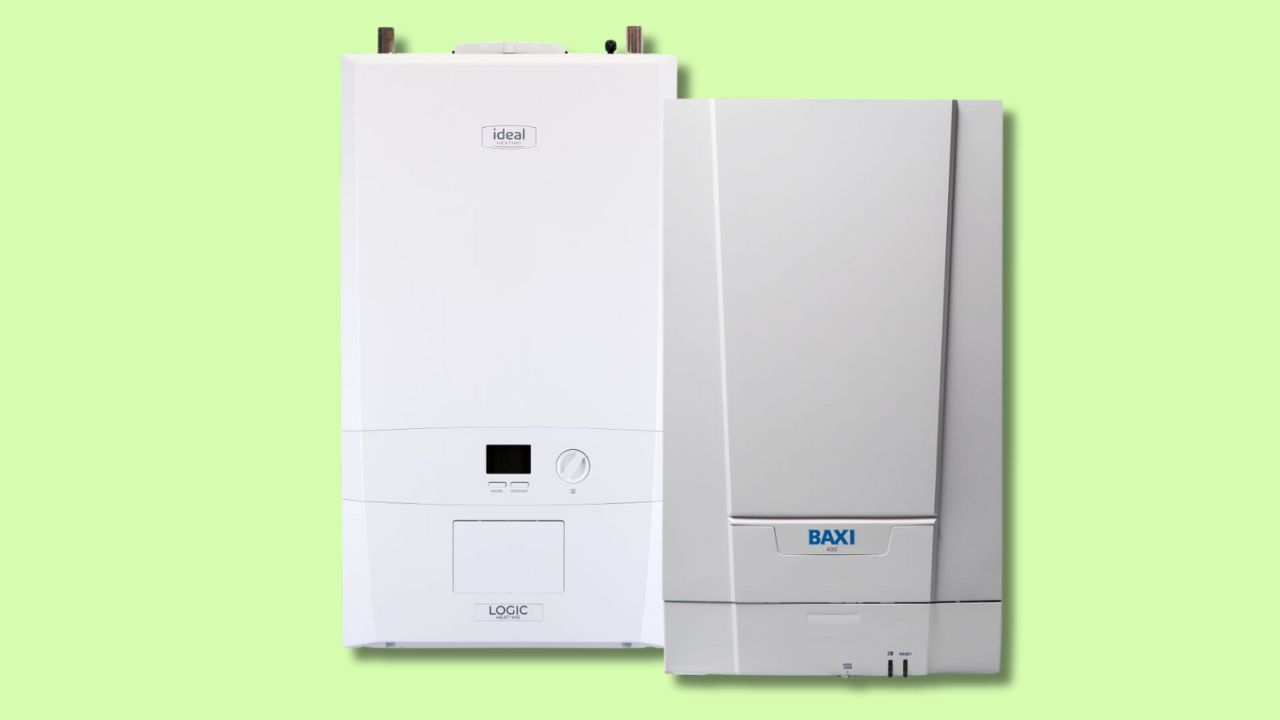
Heat-only boilers, also known as regular boilers or conventional boilers, are an ideal heating solution for larger homes, older properties, and areas with low mains water pressure.
Unlike combi boilers, they require a separate hot water storage cylinder and a cold water storage tank, making them well-suited for households with high hot water demand.
How Heat-Only Boilers Work
A heat-only boiler system operates by:
- Cold water supply – A cold water storage tank (typically in the loft) feeds water into the system.
- Water heating process – The boiler heats the water, which is then sent to a hot water cylinder for storage.
- Hot water distribution – Once heated, the water is supplied to radiators and hot water taps, ensuring a consistent flow to multiple bathrooms simultaneously.
- Expansion control – A feed and expansion tank helps regulate water levels and pressure within the system.
Unlike combi boilers, which provide instant hot water, a heat-only boiler stores pre-heated water in a hot water cylinder, ensuring availability when needed.
Fuel Options for Heat-Only Boilers
Heat-only boilers offer fuel flexibility, operating on:
- Natural gas – The most common and cost-effective option in the UK.
- Oil-fired systems – Suitable for homes off the gas grid.
- LPG (liquefied petroleum gas) – A cleaner alternative to oil.
- Electric boilers – Ideal for properties without a gas supply.
- Biomass or hydrogen-ready options – Supporting renewable energy and future-proofing heating systems.
Advantages of Heat-Only Boilers
✅ Ideal for larger homes – Can handle multiple bathrooms without losing water pressure.
✅ Compatible with older heating systems – Perfect for properties with existing radiators and pipework.
✅ Works in low water pressure areas – Unlike combi boilers, they don’t rely on mains pressure.
✅ Can integrate with solar thermal systems – Reducing energy consumption and heating costs.
✅ Reliable heating solution – Provides consistent heat and hot water for extended periods.
Disadvantages of Heat-Only Boilers
❌ Requires more space – Needs a hot water cylinder, a cold-water tank, and a feed & expansion tank, making it unsuitable for small homes or flats.
❌ Slower hot water replenishment – Once the stored hot water runs out, you must wait for it to reheat.
❌ Less energy-efficient than combi boilers – Heat loss can occur from the hot water cylinder over time.
❌ Not always compatible with modern heating setups – Newer homes with high-efficiency systems may require alternative boiler types.
System Boilers: The Upgraded Choice
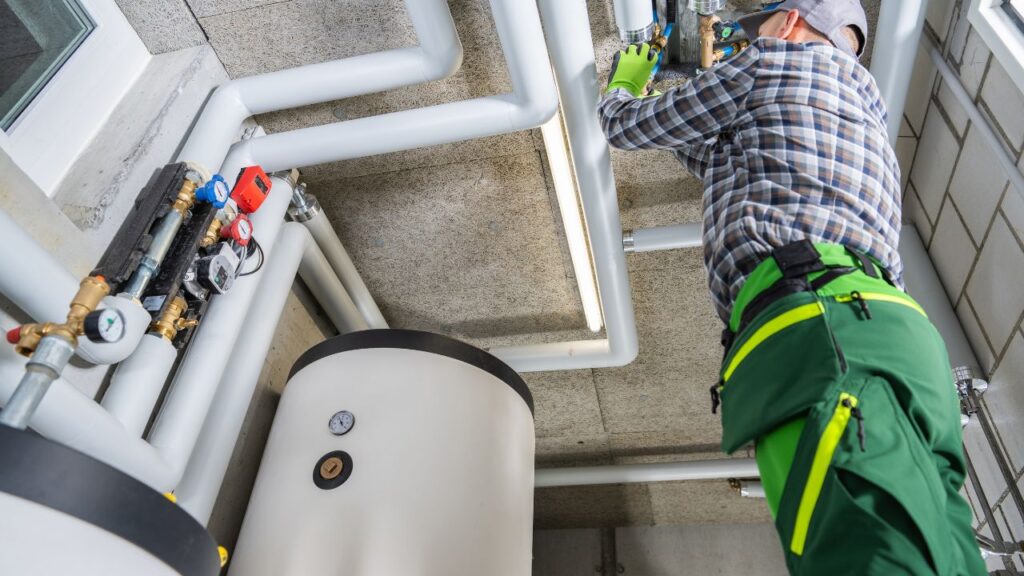
If you need a high-performance heating system that offers on-demand hot water without requiring a cold water storage tank, a system boiler might be the perfect choice.
System boilers combine key features of both combi boilers and heat-only boilers, offering:
- Hot water and central heating without a loft-mounted cold water tank.
- Strong water pressure, making them ideal for homes with multiple bathrooms.
- Unvented hot water storage cylinder for increased capacity.
- Integrated expansion vessel and pump, reducing installation complexity.
As a midway solution between combi and heat-only boilers, system boilers provide the high water flow rates of a heat-only boiler while eliminating the need for a separate water tank, making them compact and efficient.
How System Boilers Work
A system boiler setup consists of:
- Cold mains water supply – Unlike heat-only boilers, system boilers draw water directly from the mains, eliminating the need for a cold water cistern.
- Water heating process – The boiler heats the water, which is then stored in a hot water cylinder.
- Hot water distribution – Once heated, water is supplied to radiators, underfloor heating, and hot taps, ensuring consistent water pressure.
- Integrated components – The pump, expansion vessel, and safety valve are built-in, making installation easier and reducing the need for extra pipework.
This sealed system reduces the risk of leaks, freezing pipes in loft spaces, and airlocks, making system boilers highly reliable.
Fuel Options for System Boilers
System boilers are available in various fuel types, including:
- Natural gas – The most common and cost-effective choice in the UK.
- Oil-fired boilers – Ideal for properties in rural areas without gas connections.
- LPG (liquefied petroleum gas) – A cleaner alternative to oil with similar efficiency.
- Electric boilers – A low-carbon solution for homes without gas access.
- Biomass and hydrogen-ready boilers – A future-proof, eco-friendly alternative.
This versatility makes system boilers adaptable to various heating requirements.
Advantages of System Boilers
✅ High water pressure for multiple bathrooms – Unlike combi boilers, system boilers can deliver strong water pressure to multiple taps simultaneously.
✅ Compact and space-saving – No need for a cold water storage tank, freeing up loft space.
✅ Faster installation – With an integrated pump and expansion vessel, installation is quicker and more cost-effective.
✅ Compatible with solar thermal systems – Reduces energy bills by using renewable energy for heating water.
✅ Suitable for medium to large homes – Can support larger properties with high hot water demand.
Disadvantages of System Boilers
❌ Requires space for a hot water cylinder – Unlike combi boilers, system boilers need a hot water storage cylinder, which may take up airing cupboard space.
❌ Dependent on mains water pressure – If mains pressure is low, water flow may be insufficient, affecting hot water availability.
❌ Limited hot water supply – Once the stored hot water runs out, you must wait for the cylinder to refill and reheat.
Alternative Boiler Types: Oil and Biomass Boilers
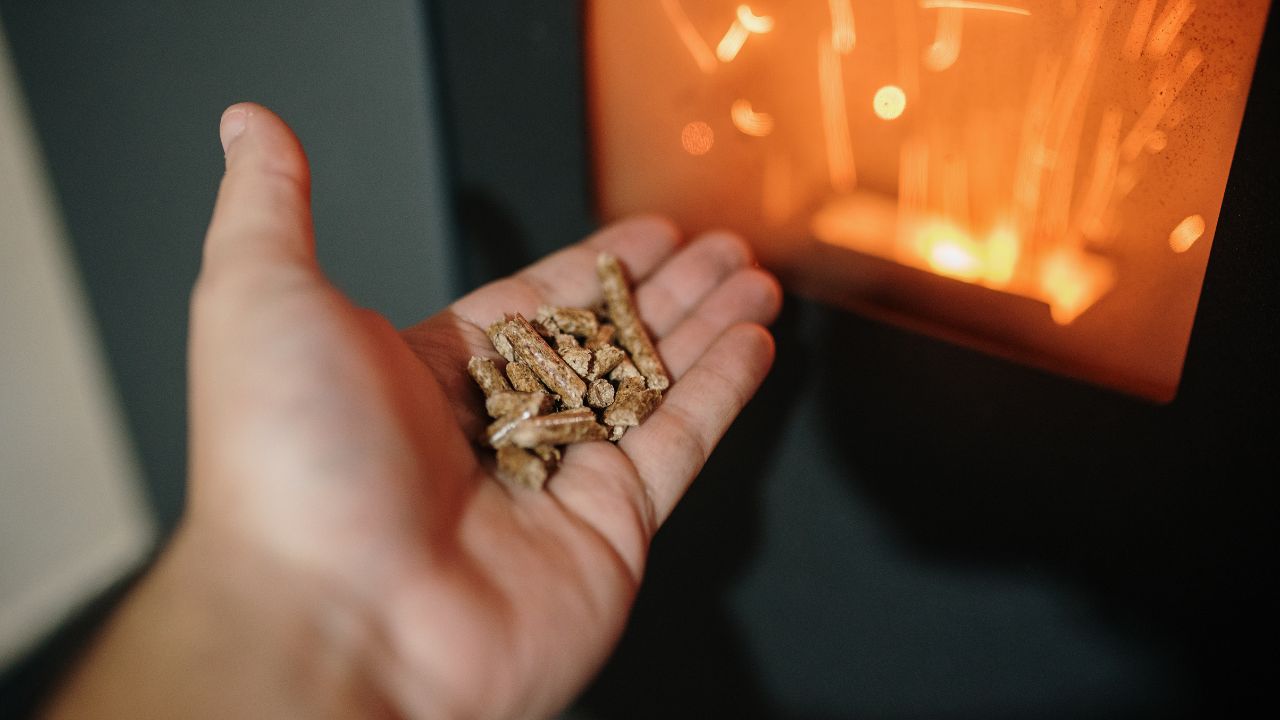
If your home lacks mains gas access, there are alternative heating solutions that can provide efficient and reliable warmth. Two common options are oil and biomass boilers. Both options cater to properties in rural areas or locations where gas connections are unavailable.
Below, we will discuss the key features, advantages, and considerations of these alternative boiler types.
Oil Boilers
Oil boilers operate similarly to gas boilers but use heating oil (kerosene) instead of natural gas. These boilers:
✔ Draw oil from an external storage tank and heat water for central heating and hot taps.
✔ Offer high efficiency, with modern condensing oil boilers achieving up to 95% efficiency.
✔ Are available as combi, system, or conventional boilers, giving homeowners flexibility based on hot water demand.
✔ Require annual servicing by an OFTEC-registered engineer to ensure safety and efficiency.
Key Considerations for Oil Boilers
🔸 Oil prices fluctuate, affecting running costs – homeowners need to monitor oil market trends.
🔸 Oil storage tanks require space and must meet safety regulations for installation and maintenance.
🔸 Long-term availability of oil is uncertain due to the UK’s transition to greener energy sources.
Despite these factors, oil boilers remain a practical heating option for homes without mains gas, particularly in rural areas.
Biomass Boilers
A biomass boiler is a renewable heating system that burns organic materials to generate heat and hot water. These include:
Wood pellets – A compressed wood-based fuel with high combustion efficiency.
Wood chips – A cost-effective fuel option, but requires larger storage space.
Logs – The most affordable, but require manual feeding into the boiler.
Unlike gas or oil boilers, biomass systems can achieve carbon-neutral heating, as the CO₂ released during combustion is offset by tree regrowth.
Benefits of Biomass Boilers
✅ Reduced carbon emissions – A sustainable alternative to fossil fuels.
✅ Lower fuel costs – Wood-based fuels can be cheaper than oil or gas.
✅ Government incentives – Eligible for schemes like the Boiler Upgrade Scheme (BUS) in the UK.
✅ Highly efficient – Modern biomass boilers can exceed 90% efficiency.
Challenges of Biomass Boilers
❌ Higher upfront cost – Biomass boilers are more expensive than gas or oil boilers.
❌ Fuel storage requirements – Requires dedicated space for storing pellets, chips, or logs.
❌ More maintenance – Ash removal and regular servicing are needed for optimal performance.
For environmentally conscious homeowners, biomass boilers provide a long-term sustainable solution, reducing dependence on fossil fuels while lowering heating costs.
When choosing between the two, consider:
- Available space – Biomass boilers require more storage than oil boilers.
- Budget – Biomass boilers have higher upfront costs but lower long-term fuel expenses.
- Sustainability goals – Biomass is the greener choice, reducing carbon emissions.
Factors to Consider When Choosing a Boiler
Choosing the correct boiler for your home can be daunting, but it doesn’t have to be. Through careful consideration of factors like:
- Property size
- Heating system needs
- Pipework
- Water pressure
- Budget
You can make an informed boiler choice that best suits your requirements.
When considering alternative boiler types like oil or biomass boilers, it’s important to consider other additional factors. For instance, you’ll need to consider the availability and cost of fuel, as well as any specific maintenance requirements.
Assessing Your Home’s Needs
A thorough assessment of your home’s unique needs and requirements is crucial to making the right decision. Consider factors such as:
- The number of radiators, bedrooms, and bathrooms in your home
- The optimal location for installation
- Any existing services and exhausts
- Relevant legal regulations
- Compatibility with your home’s location and heating needs
By considering these factors, you can ensure that you select the right boiler for your home.
The insight of a professional installer can be invaluable in guiding you towards the best boiler type for your property. By evaluating your home’s needs and seeking professional advice, you’ll be well-equipped to choose the perfect boiler for your home.
Find the Perfect Boiler for Your Home – Get a Free Quote Today!
Choosing the right boiler is essential for efficient home heating and lower energy bills. Whether you’re considering a combi, system, conventional, oil, or biomass boiler, Eco Happy makes the process quick and hassle-free.
Simply answer a few quick questions about your home and budget, and our experts will match you with the best boiler option. Within minutes, you’ll receive a personalised quote tailored to your needs—no obligation, just expert advice!
✅ Fast & Free Boiler Quotes
✅ Tailored to Your Budget & Heating Requirements
✅ Energy-Efficient Options for Lower Running Costs
Frequently Asked Questions
What are the 3 types of boilers?
The three types of boilers commonly used in homes are combi, heat-only and system boilers.
Which is better, a combi or condensing boiler?
Both combi and condensing boilers are highly efficient, as they’re designed to use less energy during the heating cycle. Therefore, when considering which type of boiler is better, it is clear that both are equally suitable options.
What is the most common boiler type in the UK?
Combi boilers are the most popular choice for domestic new boiler installations in the UK, representing over half of all new installations annually. They heat water directly from the mains, eliminating the need for hot water storage cylinders or cold water tanks.
How do combi boilers work?
Combi boilers use a heat exchanger to instantly provide hot water on demand by burning gas or oil, making them an efficient and cost-effective way to meet your hot water needs.
What are the advantages of heat-only boilers?
Heat-only boilers provide a greater hot water flow rate, making them suitable for larger properties with multiple bathrooms or high hot water demands, as well as older heating systems and areas with low water pressure mains supplies.
Conclusion
In conclusion, the right boiler type for your home depends on your specific needs and preferences. Here are the main options to consider:
- Combi boilers: Compact and energy-efficient, these are popular in the UK, particularly for small to medium-sized homes.
- Heat-only boilers: These cater to larger properties with higher hot water demands, making them a viable option for many households.
- System boilers: These provide an upgraded solution combining the benefits of combi and heat-only boilers, making them ideal for larger homes with multiple bathrooms.
Ultimately, the decision lies in your hands. By carefully considering your home’s unique needs, consulting with a professional installer, and weighing the advantages and drawbacks of each boiler type, you can confidently select the most suitable and efficient heating solution for your home.
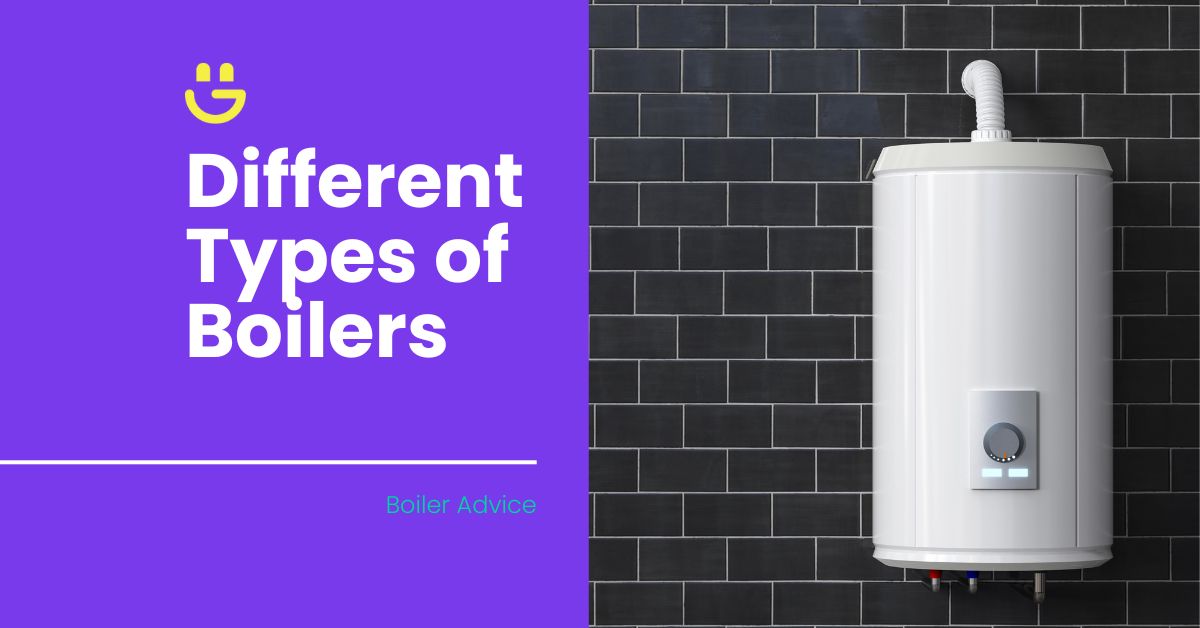





Tom Allen
Solar Expert